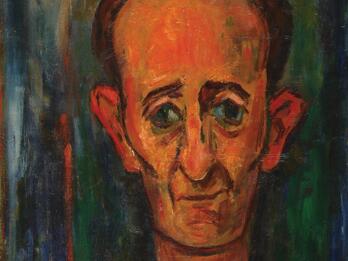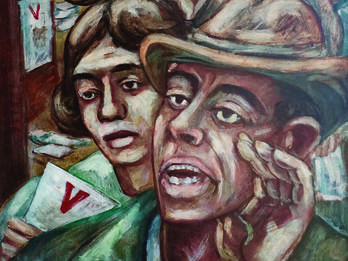Shmuel Yosef Agnon
The Nobel laureate Shmuel Yosef Agnon (known in Hebrew as Sh’aY Agnon; born Czaczkes) is widely regarded as the most important Hebrew prose writer of the modern era: an erudite and protean modernist novelist and story writer who over a sixty-year career in Galicia, Palestine, Germany, and Israel mined every stratum of traditional Jewish writing to craft intricate and gripping treatments of diasporic Jewish fate, Zionism’s promises and their limits, the beauty and compulsion of love and intimacy, and the equal incapacities of traditional Judaism and secular modernity to master suffering, irrationality, trauma, and desire. Agnon was raised in the town of Buczacz in Austrian imperial Galicia (today in Ukraine); memories of the town’s deeply rooted Jewish life haunted and fed his literary imagination throughout his life. Turning to Hebrew literature and Zionism as a young man, though not without complicated feelings about leaving the cultivated traditional Judaism of his upbringing, Agnon came to Palestine as part of the Second Aliyah.
Settling in Jaffa in 1908 he took part in the burgeoning Hebrew literary circle around Y. H. Brenner. There Agnon emerged as an utterly unique voice in Jewish literature for his unsettling fusions of seemingly traditional sensibilities with modern pathos, doubt, and complexity. It was also there that he adopted his pen name, derived from the title of one such tragic tale “Agunot” (Chained Women). From 1913 to 1924, Agnon lived in Germany, where he drew close to German Jewish cultural Zionist figures like the great publisher Zalman Schocken and the young pioneer of kabbalah scholarship Gershom Scholem. In 1924, having lost his vast personal library to a fire (an event that became a recurring topos in his work), Agnon returned to Palestine, settling in Jerusalem, and established himself once again as a unique figure in Yishuv letters, not least because in both his art and his life he cultivated an image of religious traditionalism in what was generally a radically secularist milieu. In the 1930s and 1940s, against the backdrop of the global crisis of Jewish life, Agnon wrote an astonishing series of masterpieces including the novels generally considered his greatest achievements: A Guest for the Night (1938), the great Hebrew novel of East European Jewish life in crisis, and Only Yesterday (1945), which mined Agnon’s experience of turn-of-the-century Jewish life in Palestine to wrestle with the anarchic human forces that neither modernity nor Zionism could tame. Throughout the rest of his life, he continued to write essential works on these themes in novels and short stories set variously in the East European Jewish Galicia of his childhood, historical Eastern Europe, the Yishuv of his youth, or the Israeli present. Agnon also undertook a range of anthological projects organized around the Jewish liturgical calendar; the traditional erudition of this project, and of much of his fiction, reflected a continued engagement with traditional Judaism that set him sharply apart from the other great Israeli writers of his generation. He was awarded the Bialik Prize (1934 and 1950), the Israel Prize (1954 and 1958), and in 1966 the Nobel Prize. His stature in Israeli literary culture has only grown since his death, though he is stylistically inimitable.



